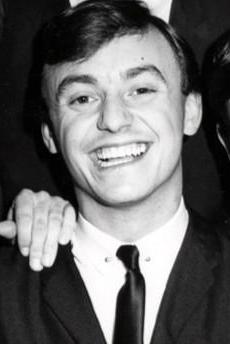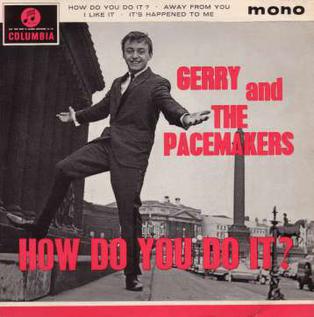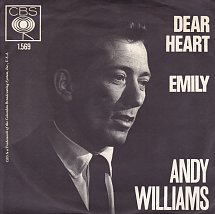
Gerry and the Pacemakers, are a British beat group prominent in the 1960s Merseybeat scene. In common with the Beatles, they came from Liverpool, were managed by Brian Epstein, and were recorded by George Martin. Their early successes alongside the Beatles were instrumental in popularizing the Merseybeat sound and launching the wider British beat boom of the mid-1960s.

"You'll Never Walk Alone" is a show tune from the 1945 Rodgers and Hammerstein musical Carousel. In the second act of the musical, Nettie Fowler, the cousin of the protagonist Julie Jordan, sings "You'll Never Walk Alone" to comfort and encourage Julie when her husband, Billy Bigelow, the male lead, stabs himself with a knife whilst trying to run away after attempting a robbery with his mate Jigger and dies in her arms. The song is reprised in the final scene to encourage a graduation class of which Louise is a member. The now invisible Billy, who has been granted the chance to return to Earth for one day in order to redeem himself, watches the ceremony and is able to silently motivate Louise and Julie to join in with the song.

Gerard Marsden MBE was an English singer-songwriter, musician and television personality, best known for being leader of the Merseybeat band Gerry and the Pacemakers. He was the younger brother of fellow band member Freddie Marsden.
"It's Almost Tomorrow" is a 1955 popular song with music by Gene Adkinson and lyrics by Wade Buff. The song was actually written in 1953, when Adkinson and Buff were in high school. Hit versions were released in 1955 by The Dream Weavers, Jo Stafford, David Carroll, and Snooky Lanson.
"Butterfly" is a popular song written by Bernie Lowe and Kal Mann and published in 1957. The song is credited to Anthony September as songwriter in some sources. This was a pseudonym of Anthony Mammarella, producer of American Bandstand.
"Pretend" is a popular song, written in 1952 by Dan Belloc, Lew Douglas, Cliff Parman and Frank Levere.

"I Can't Stop Loving You" is a popular song written and composed by country singer, songwriter, and musician Don Gibson, who first recorded it on December 3, 1957, for RCA Victor Records. It was released in 1958 as the B-side of "Oh, Lonesome Me", becoming a double-sided country hit single. At the time of Gibson's death in 2003, the song had been recorded by more than 700 artists, most notably by Ray Charles, whose recording reached No. 1 on the Billboard chart.
"On the Street Where You Live" is a song with music by Frederick Loewe and lyrics by Alan Jay Lerner from the 1956 Broadway musical My Fair Lady. It is sung in the musical by the character Freddy Eynsford-Hill, who was portrayed by John Michael King in the original production. In the 1964 film version, it was sung by Bill Shirley, dubbing for actor Jeremy Brett.

Ronnie Carroll was a Northern Irish singer, entertainer and political candidate.

"Ferry Cross the Mersey" is a song written by Gerry Marsden. It was first recorded by his band Gerry and the Pacemakers and released in late 1964 in the UK and in 1965 in the United States. It was a hit on both sides of the Atlantic, reaching number six in the United States and number eight in the UK. The song is from the film of the same name and was released on its soundtrack album. In the mid-1990s, a musical theatre production, also titled Ferry Cross the Mersey, related Gerry Marsden's Merseybeat days; it premiered in Liverpool and played in the UK, Australia, and Canada.
The Crowd was a charity supergroup formed specifically to produce a charity record for the Bradford City stadium fire, in which 56 people died on 11 May 1985. The group consisted of singers, actors, television personalities and others.
"Young and Foolish" is a popular song with music by Albert Hague and lyrics by Arnold B. Horwitt, published in 1954.

"Solitaire" is a ballad written by Neil Sedaka and Phil Cody. Cody employs playing the card game of solitaire as a metaphor for a man "who lost his love through his indifference"—"while life goes on around him everywhere he's playing solitaire". The song is perhaps best known via its rendition by the Carpenters. Another version by Andy Williams reached number 4 in the UK Singles Chart in 1973.

"My Prayer" is a 1939 popular song with music by salon violinist Georges Boulanger and lyrics by Carlos Gomez Barrera and Jimmy Kennedy. It was originally written by Boulanger with the title Avant de mourir 1926. The lyrics for this version were added by Kennedy in 1939.
"That's My Desire" is a 1931 popular song with music by Helmy Kresa and lyrics by Carroll Loveday.

"How Do You Do It?" is a song, written by Mitch Murray. It was recorded by Liverpudlian band Gerry and the Pacemakers, and became their debut single. This reached number one in the UK Singles Chart on 11 April 1963, where it stayed for three weeks.

"Don't Let the Sun Catch You Crying" is a song written by Gerry Marsden, Freddie Marsden, Les Chadwick and Les Maguire, the members of British beat group Gerry and the Pacemakers. It was first recorded and issued as a single by Louise Cordet in February 1964. Shortly after Cordet's version failed to chart, the song was recorded by Gerry and The Pacemakers themselves in April 1964. The Gerry and The Pacemakers recording became an international hit, and remains one of their best known singles.
"Lonely Street" is a 1956 song written by Carl Belew, Kenny Sowder, and W.S. Stevenson, originally performed by Belew, and later by Dave Rich. Its most successful rendition was by Andy Williams, whose version reached #5 on the Billboard chart and #20 on the R&B chart in 1959. The song appeared on his 1959 album, Lonely Street. Archie Bleyer's Orchestra played on the song.

"Dear Heart" is a song written by Henry Mancini, Ray Evans, and Jay Livingston and performed by Andy Williams. It appears on the 1965 Andy Williams album, Andy Williams' Dear Heart. The song was the theme to the 1964 movie Dear Heart. It was nominated for the Academy Award for Best Original Song and also nominated for best song at the 22nd Golden Globe Awards.
"I May Never Pass This Way Again" is a popular song, written by Murray Wizell and Irving Melsher. Perry Como performed the song on his TV show in November 1957, but it was first a hit for Robert Earl in the UK, where it reached No. 14 in 1958.









